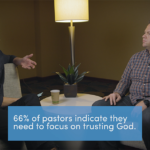
By Greg Gibbs
Growing up, very few of us were in churches that issued year-end reports. We did not even think of such a thing. That was for blue chip companies to make sure stockholders were informed and inspired. So, here’s my question: Is this important for a church to do?
As a church leader, you’re likely busy and may quickly peruse the contents of this article to get back to a frenetic existence in church leadership in America today. So, another question is: Even if it is important, do I have time to do this?
The classic version of reporting was for the church’s bookkeeper to show a P&L sheet (or a profits and loss statement) of sorts to allow for transparency. What did we spend on copier paper or did the church picnic run over budget again this year?
Let me get to my point. Times have changed. Communication is more complex than ever. And engagement (the currency of the church these days) is utterly dependent on good communication.
A year-end report is a celebration of impact that answers the question, “How did God allow us to participate with Him in the past year?” — Greg Gibbs, @auxano Click To TweetSo, presuming you’re tracking with me and still want to know how reporting drives engagement, involvement, giving, support, and more, let’s design what we mean. A year-end report is a celebration of impact that answers the question, “How did God allow us to participate with Him in the past year?” Who wouldn’t want to communicate that with their church?
As you think about compiling a year-end financial report, here are some critical features to consider that go beyond simply printing a list of expenses.
Vision Fulfilling Activities
This is the “we did what we said we were going to do” section but should not be crafted to sound that curt or defensive. But here’s the bottom line—the members of our church are wanting to know how things are going. Are we fulfilling the dreams and visions we had or are we on our way to doing so? What stories or examples can demonstrate this?
Spiritual Progress & Fruit
The idea here is to give examples of the work of God in individual lives and families. After all, beyond social connection at the church (which people may be able to get elsewhere), most of them are connected because they are committed to their faith. And this faith in Christ says we are all being transformed. And when there is evidence of God at work in transformation, we can celebrate that. Were their conversions, re-commitments, baptisms, recovery from addiction, marriages healed, etc.? This is the “only God” story. Only God could have made this happen.
Wider Influence and Impact
As we go into all the world and make disciples, our churches often have a sense of what that “going” means. Though we use energy and resources to care for a group of people (our congregation), we also have committed to making a difference in the world as we build God’s kingdom on earth.
Reminding members of the scope of the church's ministry can excite them, because they often can't keep up with it all throughout the year. Click To TweetWhat has this looked like at and through our church this year? How have we demonstrated that it is not all about us? Are there examples or expenditures that demonstrate our love for lost and disconnected people? Are there reminders of how we are investing time and people outside the walls of the church? Often, people are delighted to be reminded of these things, because they just can’t remember the scope of a church’s ministry throughout the year.
Investment of Resources
One of the areas where churches tend to lag behind other organizations and nonprofits is in their specific reporting and demonstration of use of funds. Like it or not, there is a suspicion among the broader culture, as well as inside our membership, about the way money is handled. There are creative ways to demonstrate and show transparency without having to do a line list of how much we spent on office supplies.
There is a suspicion among the broader culture, as well as inside church memberships, about the way money is handled. Leaders must demonstrate transparency. Click To TweetPeople want to know things like: Are we investing in mission to the degree that we said we would? Is the staff being compensated appropriately? Do we have reserves? Are there trends in either giving or spending that we should be aware of?
End-of-Year Giving
Have you ever considered using a special campaign to promote end-of-year giving as a type of year-end report activity? Here are three great reasons why a year-end giving challenge is as appropriate as ever, even as uncertainties still abound:
- People tend to give way more in the last 45 days of the year.
- It is an opportunity to celebrate what God is doing.
- Most organizations will ask – why not the church?
It’s not too late to consider this approach to make the most of this naturally generous season and even encourage an abundance of financial gifts to your church this year. I recently hosted a webinar with Alex Calder, director of Donor Development at Kensington Church in Detroit, where we covered some very practical ideas on this topic. You can access that webinar and its resources here.
There may be a sense of discouragement as you consider the enormous challenges your church has faced just to survive. Your gut response as you read the above suggestions may be, “Are you kidding? I’m thrilled we’re still in existence as a church. Can I write that into a report?”
God is good. And God is always at work. There is always something to celebrate. — Greg Gibbs, @auxano Click To TweetThe answer to that is: Yes. God is good. And God is always at work. There is always something to celebrate. When you have a quiet moment and can sit with a cup of coffee and a pen and pad, you may find in your recalling that there is a lot more to celebrate than you first imagined.
Better yet, gather some friends to have a time of remembering! Your mutual celebration can turn into the content of a year-end report. In this way, year-end reports feel a lot less like mimicking the blue-chip corporations and more like an act of worship of the God who deserves celebrating in every circumstance.

Greg Gibbs
Greg is director of generosity for Auxano. He has degrees in organizational communication and systematic theology. After 12 years as a pastor, Greg has spent the last two decades consulting for churches.











